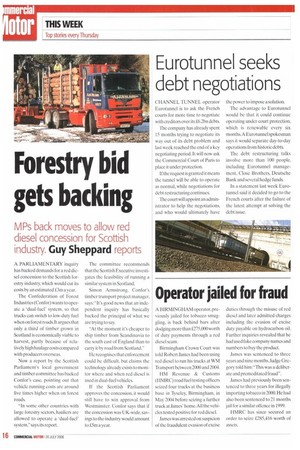Forestry bid gets backing
Page 16

If you've noticed an error in this article please click here to report it so we can fix it.
MPs back moves to allow red diesel concession for Scottish
industry. Guy Sheppard reports A PARLIAMENTARY inquiry has backed demands for a red diesel concession to the Scottish forestry industry, which would cut its costs by an estimated £3m a year.
The Confederation of Forest Industries (Confor) wants to operate a 'dual-fuel" system, so that trucks can switch to low-duty fuel when on forest roads. It argues that only a third of timber grown in Scotland is economically viable to harvest, partly because of relatively high haulage costs compared with producers overseas.
Now a report by the Scottish Parliament's local government and timber committee has backed Confor's case, pointing out that vehicle running costs are around five times higher when on forest roads.
"In some other countries with large forestry sectors, hauliers are allowed to operate a 'dual-fuel' system," says its report. The committee recommends that the Scottish Executive investigates the feasibility of running a similar system in Scotland.
Simon Armstrong, Confor's timber transport project manager, says: "It's good news that an independent inquiry has basically backed the principal of what we are trying to say.
"At the moment it's cheaper to ship timber from Scandinavia to the south east of England than to carry it by road from Scotland:' He recognises that enforcement could he difficult, but claims the technology already exists to monitor where and when red diesel is used in dual-fuel vehicles.
If the Scottish Parliament approves the concession, it would still have to win approval from Westminster. Confor says that if the concession was UK-wide, savings to the industry would amount to 5m a year.
























































































































































































